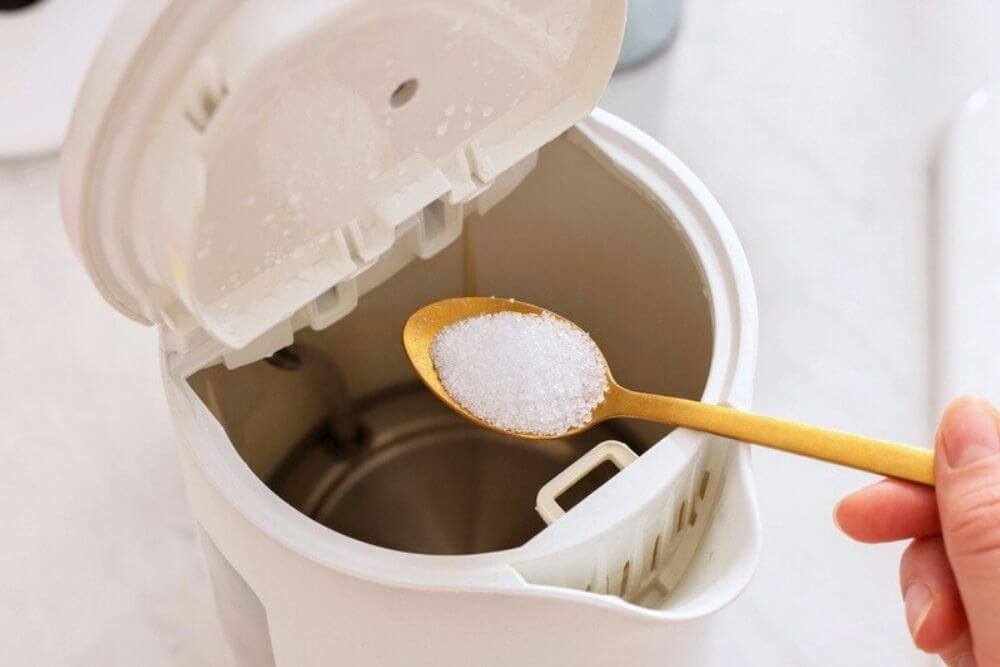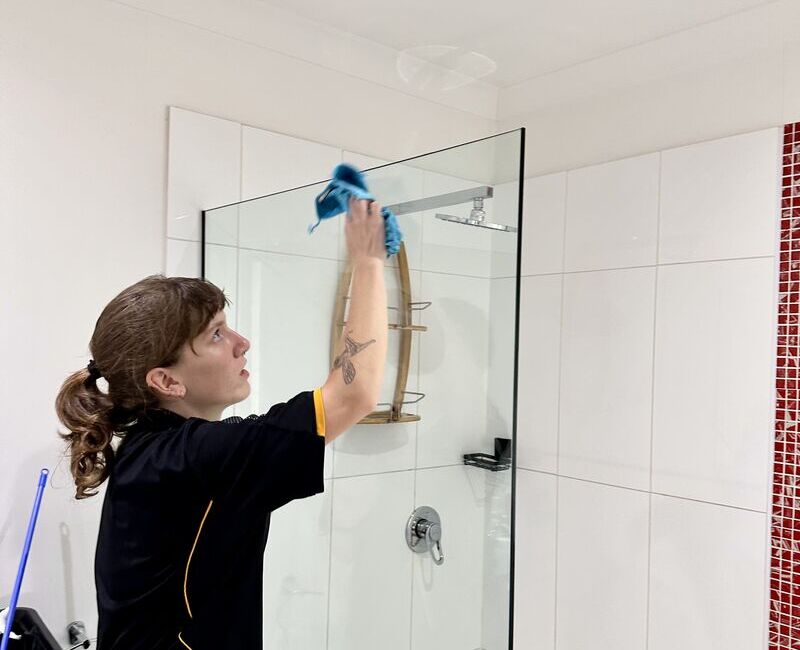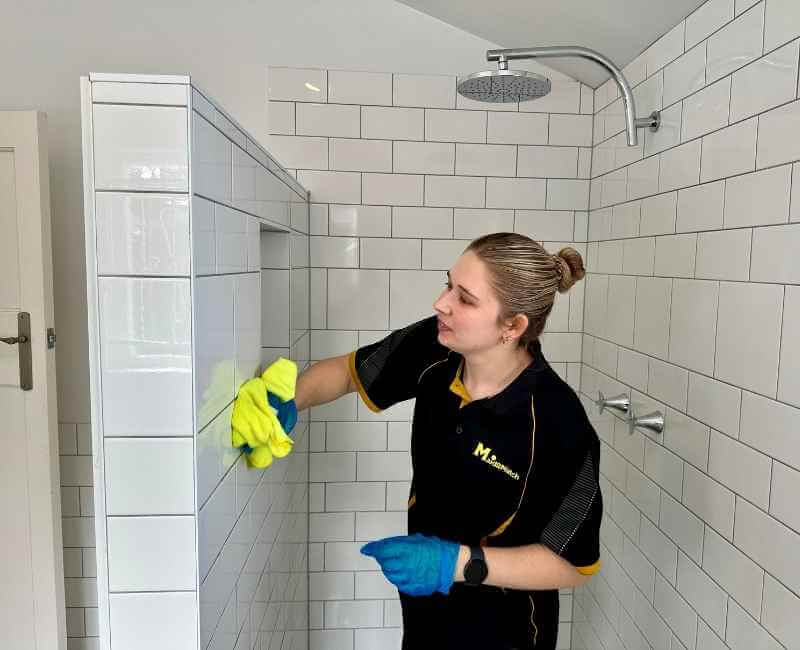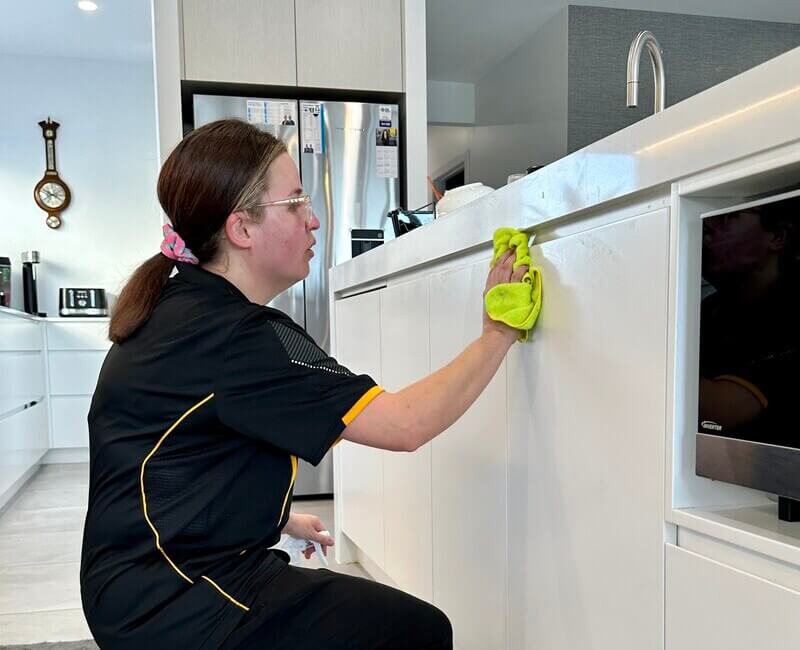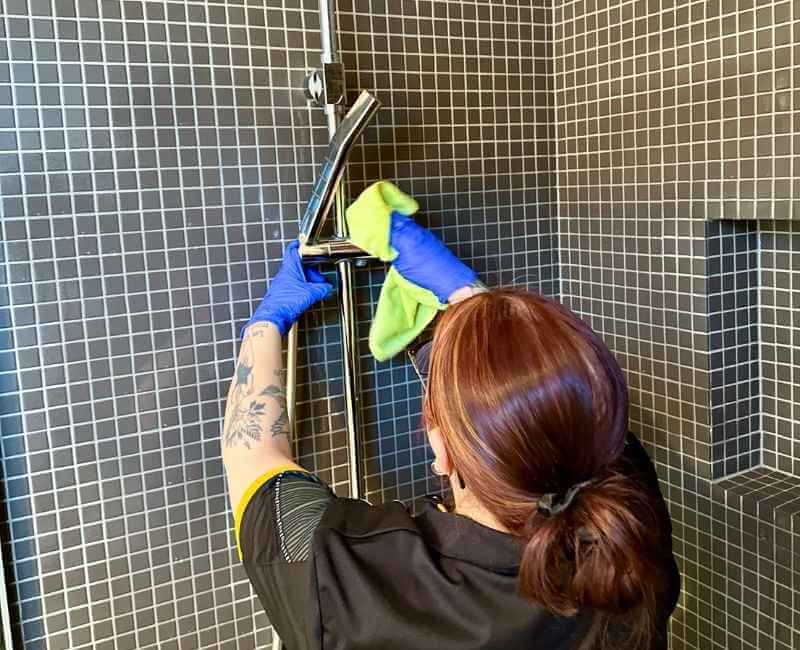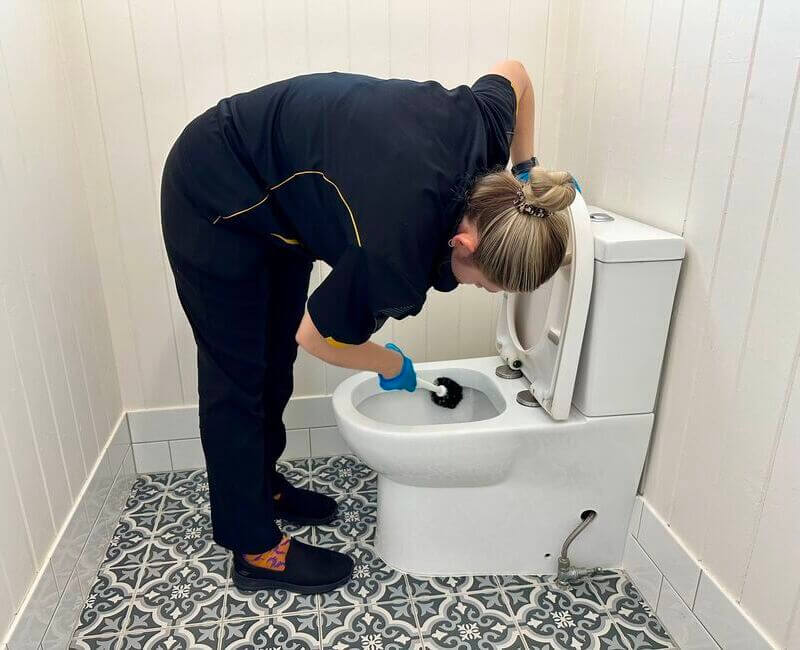Ever read a blog that recommends lemon juice for cleaning and thought, who has a whole lemon to spare for disinfecting a benchtop?
Fortunately, you can buy the compound that makes lemons so effective for cleaning — citric acid.
This underrated but versatile compound is great for cleaning around your home. Citric acid is particularly effective for tackling rust and limescale, but it has other applications, too.
When life gives you lemons, save them for cooking and cocktails. Then go buy a box of citric acid and use that for cleaning instead!
Before Cleaning | Homemade Citric Acid Cleaner | Citric Acid Cleaning Uses | Removing Stains | For Disinfecting | Can It Kill Mould? | Citric Acid vs White Vinegar
Is Citric Acid Safe for Cleaning?
Yes! Citric acid is a safe and effective cleaning solution. It’s also an eco-friendly alternative to harsh chemicals in commercial products.
Citric acid is found naturally in citrus fruits like lemons and oranges, but can also be created synthetically as a powder — fermented from mould spores, actually! The powder has a neutral odour and colour.
Like white vinegar, citric acid is a weak acid. The pH level will depend on how it’s diluted, but it’s usually around 3.0–6.0 pH. (Lemon juice has a pH of 2.0–3.0.)
At home, citric acid is typically used as a natural disinfectant and all-purpose cleaner. Many people prefer it to vinegar due to the lack of scent.
If you’re unsure about using an acidic cleaner on a surface, check the manufacturer’s or installer’s instructions to see if it’s allowed.
Citric acid may cause skin or eye irritation, especially for people with mould allergies. Always wear rubber gloves and a face mask when cleaning with citric acid, and work in a well-ventilated room.
Be careful if you have pets, though — it can cause stomach issues or irritation if ingested! However, it’s only toxic in large quantities.
Before Cleaning With Citric Acid: What to Know
Citric acid can be purchased in bulk as a powder, so it’s a cost-effective and versatile cleaner. It must be diluted before use, usually to a 5–8% concentration. That means one box can last a while.
Before you shop online or check a grocery store, it’s good to know the best ways to use it (or not use it)!
What to clean with citric acid
You can use citric acid for general cleaning, but it’s most effective at tackling:
- Rust
- Soap scum
- Limescale or hard water stains
Limescale and rust in particular contain metal compounds that react with the acid (called “chelating”). The stains get broken up and become easier to remove.
You can also use citric acid to boost your laundry, whether as a pre-soak solution or a rinse aid. It works best in hot water, as it may not fully dissolve in cooler temperatures.
What NOT to clean with citric acid
Due to the acidity, there are some things you should not clean with citric acid, such as:
- Soft metals (like aluminium)
- Wood surfaces (especially with wax)
- Natural stone (like marble or granite)
Diluted citric acid is mostly safe for porcelain or ceramic tile floors, but it’s better to stick to other tile cleaning solutions. The acidity can wear down grout over time, especially if not sealed regularly.
Be careful with using it on dark-coloured surfaces (such as fabric) since it has a mild bleaching effect.
Also, avoid mixing citric acid with baking soda! The two will cancel each other out, leaving you with a less effective solution.
Is citric acid safe for septic systems?
Diluted citric acid is generally greywater-safe and septic-safe!
As a weak, organic acid, it’s not likely to disrupt good bacteria in the soil or a septic system.
How To Make a Homemade Cleaner With Citric Acid
To make a multi-purpose cleaner using citric acid, you’ll need around a 5% dilution — about 1 part citric acid powder to 20 parts warm water.
For stubborn dirt (like calcium deposits from hard water), use a more concentrated solution of 1 part powder to 10 parts water (10% dilution).
Mix your cleaner in a spray bottle and shake well before use. Then lightly spray the surface with the citric acid solution and let it sit for up to 15 minutes.
Rinse off any residue with a damp cloth, then wipe the surface dry. If a sticky residue remains, wash it off with some hot water and dish soap!
Dispose of any leftover solution afterwards, and keep the remaining powder in a cool, dry place like a cleaning cupboard.
How to Clean With Citric Acid Around Your Home
There are several ways to use citric acid for cleaning, from the bathroom to the laundry.
Here are some recommended cleaning applications from our experienced cleaners!
Bathroom surfaces
Use citric acid for cleaning showers, bathtubs, and other surfaces around your bathroom that are prone to buildup of soap scum and limescale.
Spray the solution onto the bathroom surface and leave it for a few minutes, then rinse off with water or wipe with a damp cloth. Dry the area with a microfibre cloth afterwards.
For areas like mirrors and shower glass, you can use a squeegee after rinsing to prevent streaks.
Benchtops and cabinets
Since citric acid also has antimicrobial properties, it’s great for cleaning kitchen cabinets and benchtops, which see a lot of dirt and bacteria.
Just avoid using it on stone benchtops or painted materials, as the acid can etch or discolour the finish.
Spray the cleaning solution onto the surface and leave it for a few seconds, then wipe it off with a damp cloth. If there’s a leftover residue, wash it off with some soap and water.
Dehumidifiers and humidifiers
Both dehumidifiers and humidifiers are susceptible to mineral buildup, especially if you have hard water.
To remove the buildup, soak the water tank in a 5% dilution of citric acid and water. Then scrub off any mineral deposits with an old toothbrush.
Rinse the tank thoroughly afterwards, then dry it before putting it back into the machine.
Dishwashers
Citric acid is a common ingredient in dishwasher cleaners, but you can use it on its own, too!
Follow the recommended measurement for powder detergent for your dishwasher, but with citric acid powder. Place it in the detergent dispenser and run a short, hot cycle.
It can also remove rust stains in your dishwasher. Make a thin paste and apply it to the affected area with a damp sponge, then carefully scrub the stain off.
Wipe off any residue with a damp cloth before drying.
Kettles
One of the best uses for citric acid is descaling a kettle — especially ones made out of copper, glass, and stainless steel.
Fill your kettle halfway with water, then add 1–2 tbsp of citric acid powder. Let the kettle boil, then bring it off the heat or switch it off.
Leave the solution to sit for 20 minutes, then empty the kettle. Follow with a soft-bristled brush to scrub the surfaces clean.
Rinse the kettle before boiling a fresh batch of water to check the taste.
TIP: You can reuse the boiled citric acid solution to clean other surfaces in your home or to pre-soak stained laundry!
Faucets and shower heads
Citric acid is also great for descaling shower heads and faucets, which see a lot of mineral buildup. It will work for stainless steel, chrome, and copper, but avoid it for delicate metals like aluminium.
For handheld shower heads, soak them in a 5% diluted solution for a few hours (or for stubborn buildup, overnight).
For fixed shower heads and faucets, wet a paper towel or two in the solution, then wrap it around the head. Secure it with a rubber band and leave for a few hours.
Afterwards, scrub the nozzles with an old toothbrush before running some hot water to flush out debris.
Laundry
You can use citric acid as a laundry booster in two ways: as a pre-soak solution and a rinse aid/fabric softener substitute.
Using it as a pre-soaker lets you whiten and brighten sheets and other light-coloured fabrics. Dissolve 1/4 cup of citric acid powder per 4 litres of water, and soak the fabric for at least an hour, or even overnight.
For rinsing, use it the same way you would vinegar! Add 1/4–1/2 cup of citric acid to the rinse cycle so it can help break down any detergent residue and refresh your clothing.
Toilet bowls
Yes, citric acid is great for cleaning toilets!
For toilets with hard water stains (or limescale), sprinkle 1–2 tbsp directly into the water in the bowl. Use the toilet brush to mix the powder into the water and scrub the surfaces clean.
The same solution will work for toilet bowl rings caused by prolonged urine exposure or bacteria.
For more stubborn toilet stains (like rust), make a paste out of citric acid and water. Apply it to the affected area and let it sit for a few minutes before scrubbing it off with the toilet brush.
How to Use Citric Acid for Stains
Besides general cleaning, citric acid is good for tackling several types of stains as well.
You can either apply it as a thin paste or spray on the diluted solution. Test it on an inconspicuous spot first to make sure it won’t cause damage!
- Removing rust: Apply a thin paste of citric acid and warm water with a damp sponge, then scrub
- Removing limescale: Spray on diluted citric acid, then let sit for 10–15 minutes before washing off
- Removing soap scum: Apply diluted citric acid and leave for 10 minutes before scrubbing off
- Removing urine stains from a mattress: Dab onto the stain, then let sit for a few hours before wiping
Is Citric Acid a Disinfectant?
Yes, citric acid works as a general disinfectant! It can kill several types of bacteria and viruses, so it’s effective for many household surfaces.
Use a stronger concentration for disinfecting — about 10% dilution, or a 1:10 ratio of citric acid and hot water. Let the solution sit on the surface for at least 10 minutes before wiping it off with a damp cloth.
Thoroughly dry the surface afterwards.
Can Citric Acid Kill Mould?
Citric acid can clean surface-level mould and mildew, but it’s not the most effective solution for removing mould.
It’s better to use cleaners such as white vinegar (at least 4.2% acetic acid) or 3% hydrogen peroxide for tackling mould. For vinegar, it must sit for at least an hour on a surface.
Is Citric Acid or Vinegar Better for Cleaning?
Neither is strictly better than the other — they’re both versatile cleaners, with pros and cons!
Both citric acid and white vinegar are weak acids, though citric acid can have a lower pH depending on the concentration.
White vinegar has two distinct advantages for cleaning: it evaporates without leaving residue, and it can effectively tackle mould. However, it does have a strong odour that can linger on a surface.
Citric acid must be dissolved in water for use, and it can leave a residue if not rinsed off. On the other hand, it’s more effective against stubborn limescale or rust, and it has no odour.
You can also control the “strength” of your cleaning solution by adding more or less citric acid. That’s not the case with vinegar.
Citric acid is also pretty cost-effective — you’ll only need about 1/4–1/2 tsp per cup of water. Just make sure to store the container in a cool, dry place where it won’t get wet… and where you’ll remember to keep using it!

